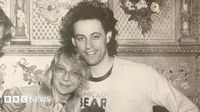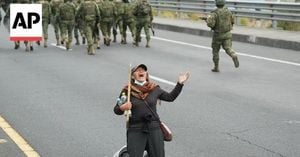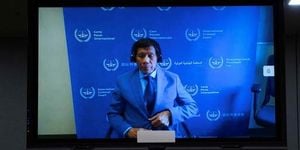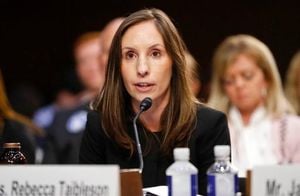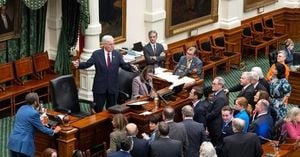On a scorching summer day 40 years ago, a musical extravaganza unfolded at London’s Wembley Stadium that would etch itself into the annals of history. Live Aid, held on July 13, 1985, was not just a concert—it was a global movement to combat the devastating Ethiopian famine. Organized by Bob Geldof and Midge Ure, the event drew a sell-out crowd of 72,000 at Wembley and millions more worldwide, with an estimated 1.9 billion people tuning in across continents.
The concert’s scale was unprecedented. Simultaneously, across the Atlantic, John F. Kennedy Stadium in Philadelphia hosted the American counterpart, creating a synchronized global effort that captivated nearly 40% of the world’s population. The London event alone featured a lineup of iconic artists whose performances have become legendary.
Status Quo kicked off the day at midday, energizing the crowd with a 14-minute set that included "Rockin' All Over The World," "Caroline," and "Don't Waste My Time." Their spirited start set the tone for an epic day of music and hope. Following them, The Style Council offered four songs, including "You're The Best Thing" and "Walls Come Tumbling Down," captivating the audience with their blend of soul and pop.
Bob Geldof himself took the stage with his band, The Boomtown Rats, performing "I Don't Like Mondays," "Drag Me Down," and "Rat Trap." The crowd’s affection was palpable, bursting into an impromptu rendition of "For He's A Jolly Good Fellow" in honor of Geldof’s tireless efforts. A poignant moment arose when Geldof paused "I Don't Like Mondays" after the line "The lesson today is how to die," drawing a standing ovation that underscored the gravity behind the music.
Among the distinguished attendees were Princess Diana and Prince Charles, seated near the stage, witnessing the unfolding historic event. Their presence added a regal touch to the day, though they departed shortly after The Boomtown Rats’ performance, missing many of the evening’s iconic moments.
The concert was a showcase of diverse talents. Adam Ant delivered a single, energetic performance of "Vive Le Rock," while Ultravox, led by co-organizer Midge Ure, enthralled the crowd with hits like "Vienna" and "Dancing With Tears In My Eyes." Spandau Ballet’s kaleidoscopic suits and eighties flair lit up the stage with "Only When You Leave" and "True." Elvis Costello’s brief but memorable cover of The Beatles’ "All You Need Is Love" sparked a massive singalong, uniting the audience in harmony.
Nik Kershaw, one of the UK’s chart-toppers at the time, held the stage for 18 minutes, performing "Wide Boy" and "Wouldn't It Be Good," among others. Soul icon Sade offered a flawless 16-minute set, including "Your Love Is King" and "Is It a Crime," adding a smooth, soulful vibe to the day.
Sting and Phil Collins alternated performances, with Sting delivering classics like "Roxanne" and "Message In A Bottle," while Collins performed "Against All Odds" and "In the Air Tonight." Their collaboration on "Long Long Way To Go" and "Every Breath You Take" was a highlight. Notably, immediately after his Wembley set, Phil Collins boarded a Concorde to Philadelphia to perform with Led Zeppelin, embodying the transatlantic spirit of Live Aid.
Howard Jones offered a touching acoustic rendition of "Hide and Seek," while Bryan Ferry, joined by David Gilmour, performed a set that included "Slave to Love" and a cover of "Jealous Guy." Paul Young, joined by Alison Moyet, delivered soulful performances, closing his set with "Everytime You Go Away."
U2’s performance was transformative for the band, propelling them into global superstardom. Opening with "Sunday Bloody Sunday," they extended "Bad" into an 11-minute epic, weaving in snippets of "Satellite of Love" and "Sympathy for the Devil." During this set, Bono famously rescued a teenage girl from being crushed in the crowd, a moment she credits with saving her life.
Dire Straits impressed with "Money For Nothing," featuring Sting, and "Sultans of Swing." However, it was Queen who delivered perhaps the most unforgettable performance of the day. Freddie Mercury’s commanding presence and the band’s masterful setlist—including "Bohemian Rhapsody," "Radio Ga Ga," and "We Will Rock You"—captivated the 72,000-strong audience. Mercury’s iconic "day-oh!" singalong remains etched in music history as a pinnacle of live performance energy.
David Bowie followed with a sublime 17-minute set featuring "Rebel Rebel" and a stirring rendition of "Heroes." The Who, despite technical difficulties that affected John Entwistle’s bass and disrupted the TV broadcast during "My Generation," closed their set with "Love, Reign O’er Me" and "Won’t Get Fooled Again."
Elton John’s lengthy set included "I'm Still Standing," "Bennie and the Jets," and "Rocket Man." He was joined by Kiki Dee for "Don't Go Breaking My Heart" and by George Michael and Andrew Ridgeley of WHAM! for "Don't Let The Sun Go Down On Me," culminating in a spirited "Can I Get A Witness." Less than three hours after Queen’s triumph, Freddie Mercury and Brian May returned for an encore performance of "Is This The World We Created?"
At 9:51 PM, Paul McCartney took the stage with "Let It Be," though his performance was marred by microphone issues that left the stadium unable to hear him for the first two minutes. The crowd, however, sang along, joined by Alison Moyet, Pete Townshend, David Bowie, and Bob Geldof on backing vocals, turning the moment into a communal celebration.
The grand finale was a powerful rendition of "Do They Know It's Christmas?" featuring a star-studded lineup including Harvey Goldsmith, Bob Geldof, David Bowie, George Michael, Sting, Andrew Ridgeley, Howard Jones, Elton John, Roger Daltrey, Midge Ure, Paul Weller, Freddie Mercury, Rick Parfitt, Adam Ant, and Bono. The two Live Aid concerts collectively raised over $127 million for famine relief in Africa, a testament to the event’s profound impact beyond music.
Behind the scenes, volunteers like Dee Flower played a crucial role in making Live Aid a reality. Based in Bexhill, East Sussex, Flower worked tirelessly alongside Geldof to organize lorries transporting aid to Ethiopia. She vividly recalls hearing Geldof’s plea on BBC Radio 1 and offering her expertise in the logistics of haulage, which led to a six-month volunteer commitment securing trucks cheaply or for free to ferry supplies to Tilbury Docks.
Flower was a special guest at Wembley, seated just three rows behind Princess Diana in the royal box, an experience she describes as "incredible" and "emotional," especially when Status Quo opened the concert. She fondly remembers the surreal meeting with Geldof at his London home, where the idea of a two-country concert was first discussed—a concept that seemed unbelievable at the time but became a defining moment in music history.
Forty years on, Dee Flower will reunite with Bob Geldof at a gala event in London, reflecting on a day that passed like a dream but left an indelible mark on the world. Live Aid remains a shining example of music’s power to unite, inspire, and effect real change.
